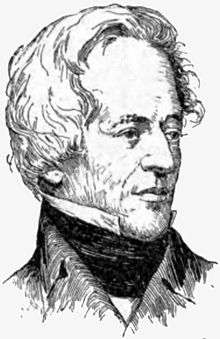William Jay (jurist)
| William Jay | |
|---|---|
 | |
| Signature | |
|
|
William Jay (16 June 1789 – 14 October 1858) was an American reformer, jurist, and the son of Founding Father and first U.S. Supreme Court Chief Justice John Jay (1745–1829).
Biography
He was born in New York City, and graduated from Yale in 1808. After his graduation, he took up the management of his father's large estate in Westchester County, New York, and also studied law at Albany. Poor eyesight soon compelled him to give up the legal profession. He early became interested in various philanthropic enterprises and reforms and identified himself especially with the temperance, antislavery, and antiwar movements. He was one of the founders (in 1816) of the American Bible Society, which he defended against the vigorous attacks of the High Church party, led by Bishop Hobart. He was judge of common pleas in New York from 1818 to 1820, and was first judge of Westchester County from 1820 to 1842, when he was removed on account of his antislavery views.
An enthusiastic member of the American Antislavery Society, whose constitution he drafted, Jay stood with Birney at the head of the conservative abolitionists, and by his calm, logical, and judicial writings exerted for many years a powerful influence. From 1835 to 1837 he was the society's corresponding foreign secretary. In 1840, however, when the society began to advocate measures which he deemed too radical, he withdrew his membership, but with his pen he continued his labor on behalf of the slave, urging emancipation in the District of Columbia and the exclusion of slavery from the territories, though deprecating any attempt to interfere with slavery in the states.
He was also a proponent of antiwar theories and was for many years president of the Peace Society. His pamphlet War and Peace: the Evils of the First with a Plan for Securing the Last, advocating international arbitration, was published by the English Peace Society in 1842, and is said to have contributed to the promulgation, by the powers signing the Treaty of Paris in 1856, of a protocol expressing the wish that nations, before resorting to arms, should have recourse to the good offices of a friendly power.
Jay was married with 8 children, all but 2 survived to adulthood. These included the lawyer John Jay (1817-1894), Anna Jay Balch, Maria Jay Butterworth, Sarah Louisa Jay Bruen and Augusta Jay Pellew.
Publications
- Life and Writings of John Jay (1833) His most valuable publication, in which the part played by his father in the diplomacy of the Revolution was first adequately pointed out.
- An Inquiry into the Character and Tendency of the American Colonization and American Anti-Slavery Societies (1834)
- A View of the Action of the Federal Government in Behalf of Slavery (1837)
- War and Peace (1848)
- Review of the Causes and Consequences of the Mexican War (1849)
Notes
References
 This article incorporates text from a publication now in the public domain: Gilman, D. C.; Thurston, H. T.; Colby, F. M., eds. (1905). "Jay, William". New International Encyclopedia (1st ed.). New York: Dodd, Mead.
This article incorporates text from a publication now in the public domain: Gilman, D. C.; Thurston, H. T.; Colby, F. M., eds. (1905). "Jay, William". New International Encyclopedia (1st ed.). New York: Dodd, Mead. Jay, John (1892). "Jay, John". In Wilson, James Grant; Fiske, John. Appletons' Cyclopædia of American Biography. New York: D. Appleton.
Jay, John (1892). "Jay, John". In Wilson, James Grant; Fiske, John. Appletons' Cyclopædia of American Biography. New York: D. Appleton. Rines, George Edwin, ed. (1920). "Jay, William, American jurist". Encyclopedia Americana.
Rines, George Edwin, ed. (1920). "Jay, William, American jurist". Encyclopedia Americana.
Attribution
-
 This article incorporates text from a publication now in the public domain: Chisholm, Hugh, ed. (1911). "Jay, John". Encyclopædia Britannica (11th ed.). Cambridge University Press. This source reports 1807 as the year he graduated from Yale.
This article incorporates text from a publication now in the public domain: Chisholm, Hugh, ed. (1911). "Jay, John". Encyclopædia Britannica (11th ed.). Cambridge University Press. This source reports 1807 as the year he graduated from Yale.